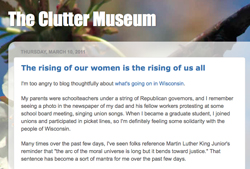The Slithergadee has crawled out of the sea.
He may catch all the others, but he won’t catch me.
No you won’t catch me, old Slithergadee,
You may catch all the others, but you wo–Shel Silverstein
During my 2006-2010 stint on the staff side of academia, I became quite familiar with the bureaucratic beast. In fact, during my last couple years at in a teaching center, I felt its bite quite acutely; it’s kind of like the bite of a Komodo dragon–you die from the venomous saliva, not the ferocity of the bite.
I recall there has been some venom toward centers of teaching and learning from the academic blogosphere over the past couple of years, and I was kind of surprised to hear it, as it seemed the faculty at UC Davis who used the teaching center were quite fond of it.
One of the reasons for this affection, I think, was the fact that (aside from TA orientations), we didn’t mandate participation in any of our workshops or events. Nor did we allow ourselves to be used as a tool in others’ requirements of faculty. We insisted that our workshops be optional–that we were there to help, not to compel, for example, when a vice provost needed all 100+ departments to articulate undergraduate learning objectives for the reaccreditation process. And while we kept up with the research on teaching and learning, most of our advice came from our own time spent teaching students and from the ideas shared by other campus faculty.
Still, despite our attempts to hold our ground against bureaucratic intrusion, the teaching center’s corner of the university became increasingly bureaucratic, with administrators putting ridiculous new requirements in place. So, for example, they required that administrative staff members’ relatively new Macs be lobotomized so that they only functioned as Windows PCs. It doesn’t help when all the Ph.D.-holding employees and the non-degree-holding employees are divided into camps, especially when we’d worked very hard as a center to break down those silos. Yet the bureaucrats, barely feinting at consulting with front-line staff, decided that half the teaching center staff should report to an administrative middle manager and half to the center’s faculty director. That slowed some work and decreased our motivation significantly, as middle management is about efficiency, while center directors focus on vision and mission. There were other decisions, too, that were made without consulting those of us who actually worked with faculty and graduate students to improve teaching.
For teaching centers to do their work well, they need to be free of bureaucratic restraints, and their staff certainly can’t be see as enforcers of administrative dicta or as professionals offering one-size-fits-all (Blackboard!) “solutions” to teaching challenges.
I’ve been impressed by many of the offerings of the teaching center at my current university, and I’ve participated in several programs coordinated through that office, most notably a semester-long pilot on using mobile devices in the classroom.
The university is revising its core courses (which is très trendy, I know), and one of the requirements is that departments submitting courses–new or existing–to be included in the core send representatives to workshops on designing core courses. (Surprise! Many, if not most, of the reps sent to these workshops are adjuncts, though I will say the history department appears to be sending only tenure-line faculty.) I offered to attend as a representative of the relatively new History 100 course, Themes in World History. (N.B.: The last time I took a world history course was in the eighth grade. Wheeeeeeeee! Course design without content knowledge–playing to my strengths!)
The workshop basically exists to help me fill out a form that includes me to write the course title; a table listing learning objectives, assessment plans, and learning activities; a plug-in-your-course-name-and-description required syllabus statement; and a disabilities statement?
That kind of work should take me 60-90 minutes.
Have I mentioned that the workshop is scheduled to run from 8:30 to 4:30 for three days? (cue terrifying music)
To be continued. . .
After a full day of outcomes-ing, I’m tuckered out, but I’ll share more thoughts on this soon,* as there’s a lot of the usual error going on.
* Previews!
From a faculty member: “Blind students can’t do electrical engineering.”
Bureaucratic fiat: “Yes, all faculty teaching sections of the course must use the same assessment plan.”

